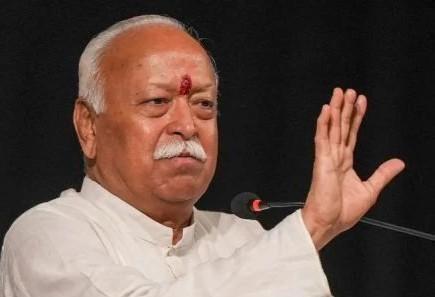
Title: If someone turns to evil then we’ll teach lesson: Bhagwat on J&K attack
In the wake of the recent terror attack in Pahalgam, Jammu and Kashmir, RSS chief Mohan Bhagwat has made a statement that has sparked both controversy and debate. Speaking to the media, Bhagwat said that non-violence is indeed India’s religion, but so is teaching a lesson to “oppressors and hooligans”. His statement has been met with both support and criticism, with many questioning the need to “teach a lesson” to those who commit such heinous acts.
The statement by Bhagwat comes at a time when the nation is reeling from the devastating attack that left several innocent lives lost and many more injured. The attack, which was carried out by a group of terrorists, has left the people of Jammu and Kashmir shaken and demanding justice.
Bhagwat’s statement, which has been widely reported in the media, has sparked a heated debate on social media and among political circles. While some have hailed his statement as a necessary response to the growing threat of terrorism, others have criticized it as a call to violence and a departure from India’s long-standing commitment to non-violence.
In his statement, Bhagwat emphasized that the RSS and its affiliates will never harm or disrespect their neighbors, but added that if someone is bent on being evil, then what is the cure? He also said that the king’s duty is to protect the people, and he will do his duty.
Bhagwat’s statement has been seen as a veiled reference to the government’s response to terrorism in the region. The RSS has long been a vocal advocate for a tougher approach to dealing with terrorism, and Bhagwat’s statement appears to be a call to the government to take a more robust stance against those who commit such acts.
However, many have criticized Bhagwat’s statement as a call to violence and a departure from India’s long-standing commitment to non-violence. They argue that such statements only serve to perpetuate a cycle of violence and that a more nuanced approach is needed to address the complex issue of terrorism.
The debate surrounding Bhagwat’s statement has also highlighted the complex and often contentious relationship between the RSS and the government. The RSS has long been a powerful and influential organization in India, and its views are often seen as important indicators of the nation’s political and social mood.
The statement by Bhagwat has also been seen as a reflection of the growing frustration and anger among many Indians in the wake of the Pahalgam attack. The attack has left the nation reeling and many are demanding a more robust response to the growing threat of terrorism.
In conclusion, Bhagwat’s statement on the J&K attack has sparked a heated debate on social media and among political circles. While some have hailed it as a necessary response to the growing threat of terrorism, others have criticized it as a call to violence and a departure from India’s long-standing commitment to non-violence.
As the nation continues to grapple with the aftermath of the Pahalgam attack, it is clear that the debate surrounding Bhagwat’s statement will continue to rage on. It is also clear that the nation needs a more nuanced and informed approach to addressing the complex issue of terrorism, rather than simply resorting to calls to violence and retribution.
News Source:
https://youtu.be/SpAKVWl5wII






